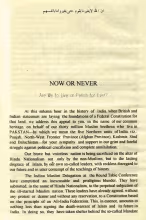In 1933, Choudhry Rahmat Ali, a student at Cambridge, distributed a pamphlet titled, Now or Never; Are We to Live or Perish Forever? in which he voiced the opinion that the Muslims of British India ought to unite to counter the efforts of the Hindu nationalists. He concentrated on the Muslim majority regions of British India, namely,
- Punjab
- Afghan (North-West Frontier Province)
- Kashmir
- Sind
- Baluchistan
or PAKSTAN in short. An i was added to ease pronunciation giving rise to the word, Pakistan. This was adopted by Muslim nationalists to form the Pakistan Movement or Tehrik-e-Pakistan.
The opening paragraph of Ali's pamphlet read:
At this solemn hour in the history of India, when British and Indian statesmen are laying the foundations of a Federal Constitution for that land, we address this appeal to you, in the name of our common heritage, on behalf of our thirty million Muslim brethren who live in PAKISTAN—by which we mean the five Northern units of India, viz.: Punjab, North-West Frontier Province (Afghan Province), Kashmir, Sind and Baluchistan—for your sympathy and support in our grim and fateful struggle against political crucifixion and complete annihilation.
After independence and partition, Rahmat Ali voiced his dissatisfaction with the size of the newly created Pakistani nation. But he arrived in Pakistan in 1948 fully intending to make it his home. However, in an ironic twist of fate, Pakistani PM, Liaqat Ali Khan, ordered him to leave the country. His belongings were confiscated and he was forced to return to England. He died in 1951.

